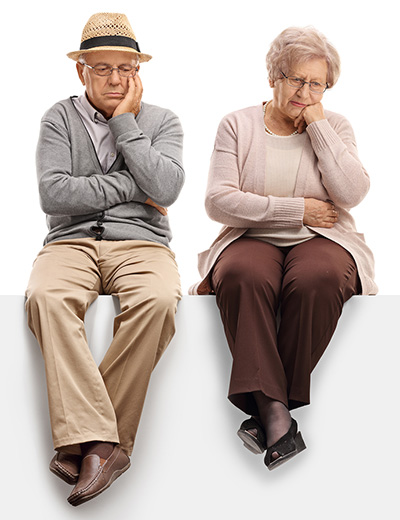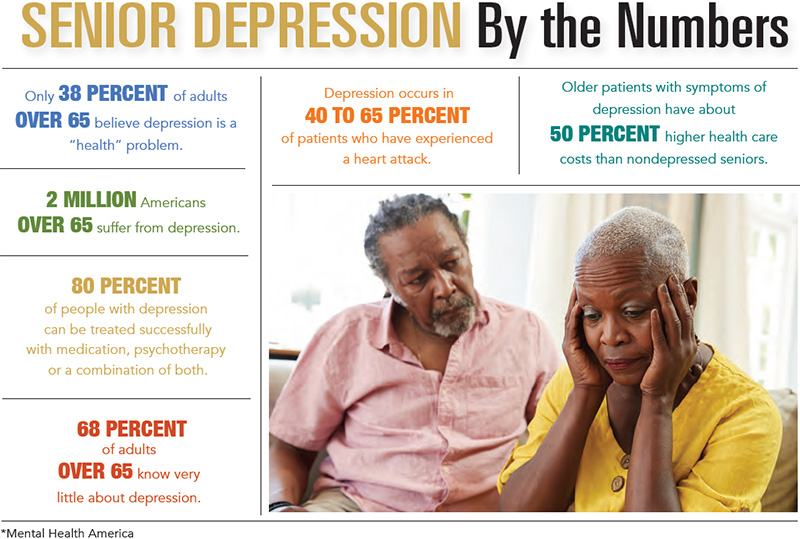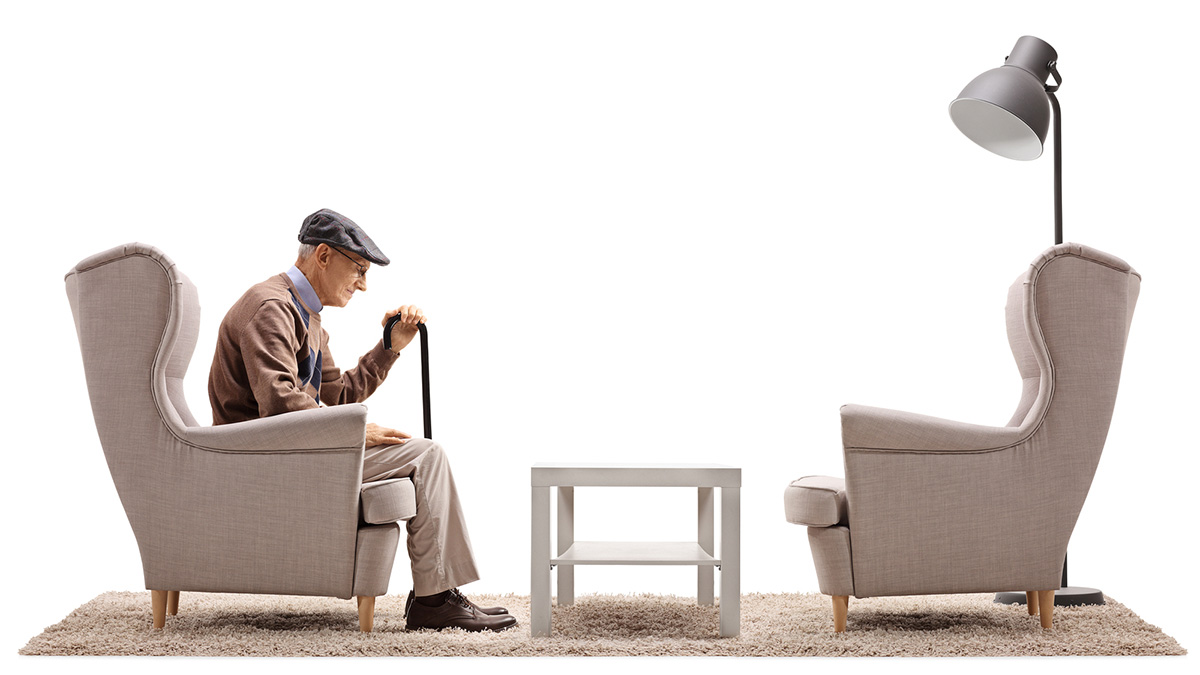It can happen more easily than you think: a once-healthy, active and social person may experience any number of issues as a senior which could open the door for the development of depression. Often, the symptoms of depression are overlooked, and, according to the nonprofit group Mental Health America, the condition is commonly left untreated in the senior population.
Depression manifests itself in many ways, among them sadness, unexplained pains, loss of interest in hobbies or socializing, sleep problems and slowed movement or speech. One concern, though, is that these often are symptoms of other health problems.
“People tend to diagnose themselves, but, if you or a loved one is exhibiting some of the red flags, it’s important to see a doctor or therapist,” explained Eunice Lehmacher of Greenville Health System’s Memory Health Program. “Depression has many look-alikes, like lack of sleep, dementia or chronic fatigue syndrome. There are ways to get help, but it’s important to treat the right issue.”
Though there are varying levels of the severity of depression, the Centers for Disease Control estimates that depression affects 1 in 10. For seniors, unrelated health problems, co-related health problems and isolation or loneliness are common segues to depression.
 “Think for a moment what’s hard about being a senior. You can’t do everything you used to usually do,” Lehmacher continued. “Once you stop doing something you used to do all the time, it’s hard to get the motivation to pick it up again.”
“Think for a moment what’s hard about being a senior. You can’t do everything you used to usually do,” Lehmacher continued. “Once you stop doing something you used to do all the time, it’s hard to get the motivation to pick it up again.”
For example, a minor injury or persistent joint pain could be a reason to take a break from a regular exercise routine, but pushing your body to get back up to speed once you’ve stopped is easier said than done.
“People will say ‘I know if I exercise, I would feel better,’ but they don’t have the motivation anymore. Then it’s even more depressing,” she said.
As we age, chronic illnesses and diseases that are more common in seniors can activate symptoms of depression. Mental Health America claims that a common misperception is that depression is a “normal” emotion for people suffering from serious conditions like heart disease, cancer, stroke, arthritis, Parkinson’s or Alzheimer’s disease. Though some treatments of those health problems may alleviate the symptoms of depression, they do not treat the root of depression, so it is important to treat them simultaneously.
Isolation and loneliness are unfortunately common in seniors and are linked to depression as well. Hearing loss is one trigger. When someone loses their ability to hear clearly or can no longer hear certain levels of sound, it can be frustrating and embarrassing to continue asking others to repeat themselves. Withdrawal and reluctance to be involved in social situations soon follow and can lead to depression, along with a host of other illnesses.
The loss of a spouse also is a common way people can slip into depression.
“When your spouse of 50 years passes away, of course you feel sad and exhibit a lot of those red flags that signal depression. But it’s also healthy to understand that grief is OK. You’re supposed to be sad, but therapy, socialization and doctors can all help,” Lehmacher said.
In fact, there are several avenues to treat depression; medication, counseling, socialization, laughter, exercise, diet and even sunlight can help improve your mood. Lehmacher suggested incorporating several in combination to best benefit your health.
Ashley Seeds, executive director of Wellmore of Daniel Island, sees the benefits of socialization through the residents of the senior living community. Programs, events and buddy systems all encourage seniors to interact.
“Socialization is a huge factor when it comes to battling depression in seniors. As people get older, they feel less capable and welcome in the outside community and social environment, so they tend to seclude themselves where they feel more comfortable: at home. When engaged in stimulating mental and physical activities, we have seen even the most shy and reclusive residents blossom into social butterflies,” Seeds said.
 To combat depression even before it starts, Seeds suggested getting involved in something that interests you. Senior living communities, senior centers and other venues offer a variety of programs such as music, arts, exercise, book clubs, outdoor games, outings to restaurants and attractions, and more. When you build a network of friends who count on you to be somewhere at a certain time, the isolation begins to thaw. Having close friends who notice when you don’t show up and then check on you or offer to give you a ride can improve motivation and follow-through on social activities.
To combat depression even before it starts, Seeds suggested getting involved in something that interests you. Senior living communities, senior centers and other venues offer a variety of programs such as music, arts, exercise, book clubs, outdoor games, outings to restaurants and attractions, and more. When you build a network of friends who count on you to be somewhere at a certain time, the isolation begins to thaw. Having close friends who notice when you don’t show up and then check on you or offer to give you a ride can improve motivation and follow-through on social activities.
Lehmacher calls the steps, activities and efforts to improve mood “depression busters,” and exercise is a big one. It is said that 30 to 90 minutes of aerobic exercise – like swimming, jazzercise or walking fast – five days a week, as well as strength training, can activate chemicals in your body that fight depression. The effects are not immediate but improve over time.
Sunlight is another depression buster.
“If you lived in Alaska or Norway, you’d notice how many people get depressed in winter when full sunlight is available less than four hours a day,” she continued. “If you’re feeling down, go outside on sunny days. If you add a walk or a visit with a neighbor, you’re doing two depression busters at once!”
 Eating healthy foods is yet another great way to counter depression. Foods that nutritionists suggest include nuts like cashews and brazil nuts, cabbage, raw cocoa, foods with omega-3 fatty acids, brewer’s yeast, hot peppers, brown rice, whole grain oats and other whole grains such as quinoa, kamut and spelt. Contrastingly, avoid foods that can lead to depression, such as those high in sugar or fat, and excessive coffee or alcohol.
Eating healthy foods is yet another great way to counter depression. Foods that nutritionists suggest include nuts like cashews and brazil nuts, cabbage, raw cocoa, foods with omega-3 fatty acids, brewer’s yeast, hot peppers, brown rice, whole grain oats and other whole grains such as quinoa, kamut and spelt. Contrastingly, avoid foods that can lead to depression, such as those high in sugar or fat, and excessive coffee or alcohol.
If you or your loved one seems to be experiencing depression, it’s important to seek medical help and to follow through on treatments with supplemental improvements like medication, therapy, socialization, exercise and nutrition. Depression is not something that should be left untreated, and, with help, treatment can help the golden years be some of the best yet.
By Anne Shuler Toole

